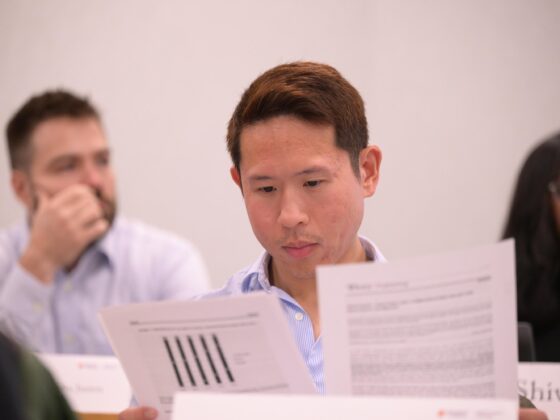Today’s post authored by Second Year student Jeremy Rosenthal (Class of 2021). Rosenthal is a member of the Second Year Admissions Committee, a group of students who work alongside Darden’s Admissions team to recruit future classes of MBA students. This group of students also serves as informal ambassadors to the Darden experience, lending their own knowledge and expertise to prospective students and applicants.

By Jeremy Rosenthal:
I applied to business school twice, the first time being an uninformed, shot-in-the-dark misadventure. The second time around, though, I was armed with lessons learned from my prior follies, and I was fortunate to land at Darden, which has been a transformative experience. With this blog post, I hope to pass some of this hard-won wisdom onto you, so that you can put forward your best application.
Before turning my attention to some Darden-specific advice, I’d like to offer a nugget of the general, all-purpose variety:
1. Expand your consideration set. I did not apply to Darden during my “dress rehearsal” application cycle. As someone who was working in the education sector prior to business school, I couldn’t afford to cast a wide net and apply to as many schools as possible, as some well-intended folks had suggested. While my budget limited the number of schools that I could visit and apply to, nothing was stopping me from exploring a broader set of schools via their websites, alumni networks, and their coverage in online forums. Don’t look back on your application cycle and wish that you would have taken a closer look at that school which fell just outside of your initial consideration set.
One of the things that makes Darden so special is that its students chose Darden before Darden chose them. Few Darden students come to Charlottesville by accident — they come having deliberately chosen to join this community, which brings me to the first piece of Darden-specific advice:
2. Confirm that Darden is a “fit” before you apply. Too much is made of how business school aspirants can bend their application materials to match a given school’s culture and not enough is made of the importance of aligning with said school’s culture in the first place. In other words, first determine if you “fit” before you worry about how to communicate this fit.
Darden is a rigorous place where students are expected to be engaged both in and outside of the classroom — it is far from a passive experience. At the same time, it is also a collaborative community, where fierce competition is more the domain of Darden Cup (a year-long battle between class sections) than it is of grades or recruiting. But don’t take my word for it: reach out to Darden students and recent alumni via LinkedIn or the Student Ambassador program to get the inside scoop. If these conversations truly energize you, it will be evident in your application and interview.
3. Own your impact. The application is your proverbial “time to shine.” Your resume shouldn’t read as an enumeration of your job responsibilities; rather, it should make clear the ways in which you left your fingerprints on the organizations you’ve been part of. When I was writing my resume I sometimes struggled to quantify my impact. While doing so is especially effective, some of the most compelling bullets on my resume have to do with accomplishments that can’t be captured by a single number, such as the times when I took initiative to spearhead projects at work. In other words: numbers are great and all (says this former math teacher), but don’t feel constrained to have to weave them into every single resume bullet point.
4. Provide context for your accomplishments. Great, you “improved efficiency by 20%.” But was your job to improve it by 10%? 30%? How did you stack up against your coworkers? And, wow, you won an award named after a fancy-sounding long-dead person (seriously, though, congrats!). But unless that fancy-sounding, long-dead person is named Nobel or Pulitzer, I’ll likely need an explanation. For a gut check, share your application with someone whose judgement you trust but who doesn’t know you terribly well. Where do they ask for clarification? Where do they need context?
5. Share your passions. Devote some resume real estate to your hobbies and interests and be sure to thoughtfully fill out the portion of the application devoted to these pursuits. If the annual talent show is any indication, Darden students are wildly talented and passionate about the things they do when they’re off-the-clock.
If the uninformed, shot-in-the-dark misadventure that was my first MBA application cycle taught me anything, it is this: there is a school out there for you, as there was one for me. I wish you the best of luck in finding where you “fit” and in crafting the winning application that gets you there.
Be sure to consult the Latest News regularly for the most updated news releases and media hits. Check out faculty thought leadership published on Ideas to Action. And stay connected with us via social media: Facebook, Instagram, LinkedIn, Twitter, WeChat





